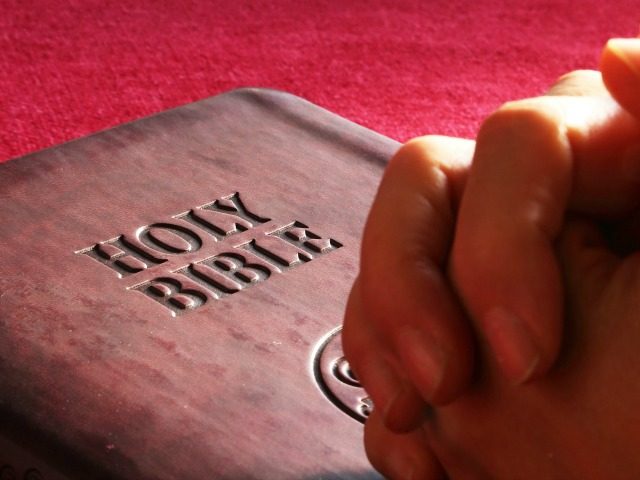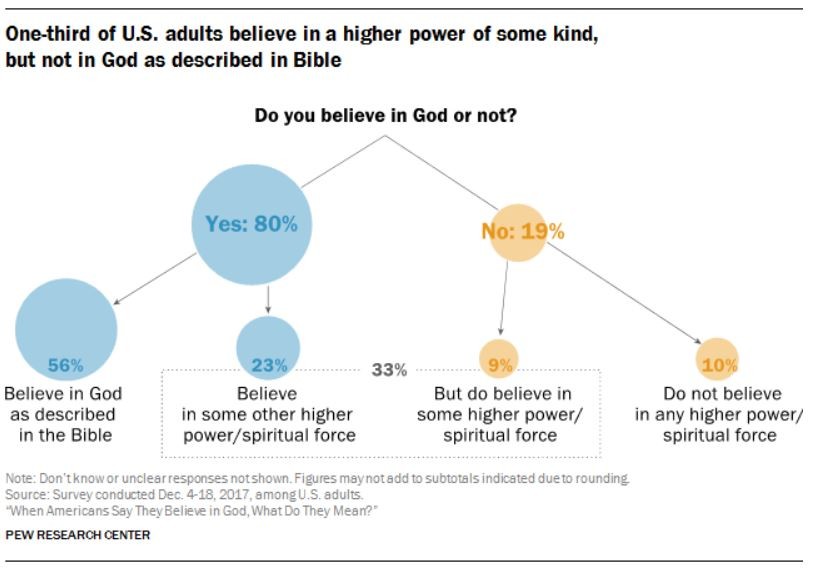Despite recent signs of ebbing religious faith among Americans, the vast majority still believe in God or some sort of divinity, the Pew Research Center revealed in a report Wednesday.
Even among the religiously unaffiliated in the U.S. (the so-called “nones”), a significant majority (72 percent) believe in a divinity, though often not the God as described in the Christian Bible.
While some ten percent of Americans are atheists and do not believe in any sort of divinity or higher power, 90 percent believe in a divinity or higher power of some sort and 56 percent say they believe in God “as described in the Bible,” Pew reports.
Among U.S. adults who identify as Christians, eight-in-ten say they believe in the God of the Bible, and only one-in-five say they do not believe in the biblical God but do believe in a higher power of some kind. Almost no self-identified Christians (just 1 percent) say they do not believe in any higher power at all.
By contrast, more than half (56 percent) of American Jews say they do not believe in the God of the Bible but do believe in some other higher power or spiritual force in the universe. Roughly a third of U.S. Jews say they believe in the God of the Bible.
The Pew study sought to get a better sense of what Americans mean when they say they do or do not believe in God, since people’s understanding of God or divinity has also evolved over time, and the questions were tailored accordingly.
Americans who say they believe in God “as described in the Bible” generally envision an all-powerful, all-knowing, loving deity who determines most or all of what happens in their lives, Pew declared. Those who say they do not believe in the biblical God but believe in a “higher power or spiritual force” on the other hand, “are much less likely to believe in a deity who is omnipotent, omniscient, benevolent and active in human affairs,” Pew said.
Most Americans believe in a God who directly intervenes in human affairs, with nearly 80 percent of U.S. adults saying that God or a higher power has protected them, and two-thirds say they have been rewarded by the Almighty.
Around 60 percent of Americans believe in a final judgment and accounting after death, and some 40 percent say they have been punished by God or the spiritual force they believe is at work in the universe.
Pew also found that three out of four U.S. adults say they try to talk to God (or another higher power), while some 30 percent say that God (or a higher power) talks back. There was also some confusion regarding the meaning of prayer, since 39 percent of those who say they rarely or never pray report that they do “talk to God.”
Americans’ belief in God vary substantially according to their political leanings, Pew found, with seven in ten Republicans and those leaning toward the GOP saying they believe in God as described in the Bible, whereas among Democrats and those who lean Democratic, less than half (45 percent) believe in God as described in the Bible.
Nearly three times as many Democrats as Republicans say they do not believe in any higher power or spiritual force at all (14 percent vs. 5 percent).
Politically speaking, the most irreligious group in America is composed of white Democrats.
A mere third of white Democrats say they believe in God as described in the Bible, while 21 percent do not believe in a higher power of any kind.
A majority of nonwhite Democrats, on the other hand, say they believe in God as described in the Bible, and seven-in-ten or more say they believe God is all-loving, all-knowing or all-powerful. In these ways, “nonwhite Democrats have more in common with Republicans than they do with white Democrats,” Pew found.
The Pew survey of more than 4,700 U.S. adults was conducted from December 4 to 18, 2017, and its associated report was released on Wednesday.
Follow Thomas D. Williams on Twitter Follow @tdwilliamsrome


COMMENTS
Please let us know if you're having issues with commenting.